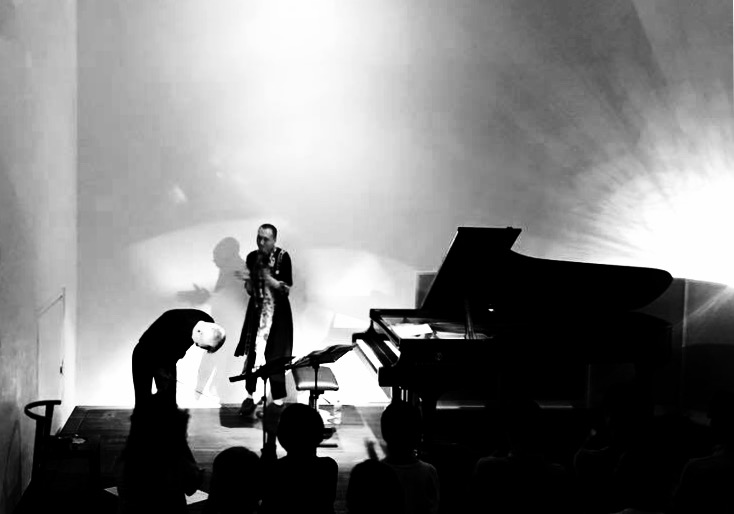#965 喜多直毅&田中信正 “Contigo en La Distancia” ニューアルバム完成記念コンサート
Naoki Kita & Nobumasa Tanaka: Celebrating concert of the release “Contigo en La Distancia”
2017年7月14日(金)@東京/永福町sonorium
Sonorium, Eifuku-cho, Tokyo/July 14(Fri), 2017
Reported by 伏谷佳代 Kayo Fushiya
<出演/Performance>
喜多直毅 (ヴァイオリン) Naoki Kita (violin)
田中信正 (ピアノ) Nobumasa Tanaka (piano)
<制作/Production>
喜多直毅 Naoki Kita
<制作協力/Co-production>
ピアノハウスエムエムジー Pianohouse mmg
<協力/Support>
Syntax Japan Inc.、OTTAVA
<フライヤ・デザイン/Flyer Design>
山田真介 Shinsuke Yamada
<プログラム/programme>
1. 「難船」Naufrágio (C. Meireles/A.R.B. Oulman)
2. 「オーリャ・マリア」Olha Maria (V.de Moraes/A. C. Jobim – C. Buarque)
3. 「孤独」Soledad (E.F. Jodar)
4. 「ショリーニョ・プラ・エリ」Chorinho Pra Ele (H. Pascoal)
5. 「バチンの少年」Chiquilín de Bachín (H. Ferrer/A. Piazzolla)
6. 「リベルタンゴ」Libertango (A. Piazzola)
7. 「アルフォンシーナと海」Alfonsina y El Mar (F. Luna/Ariel Ramírez)
8. 「遠く離れていても」Contigo en La Distancia (C. P. de la Luz)
*アンコール/encore
「フラーク・ニヒト・ヴァルム・イッヒ・ゲーエ」Frag Nicht Warum Ich Gehe (R. Tauber)
同名のアルバム発売記念コンサート。リサイタルと称するに近いストイックな緊張感、しかしながら類を見ない空間牽引力。冒頭の「難船」が始まるや、会場全体がゆっくりと波動し始める。パフォーマンス・スタイルは、喜多クアルテットと同様、メドレー形式。MCなし。構成はアルバム収録曲を中心とするが、佳境にピアソラの「リベルタンゴ」が加わった。
抑止と放出、その開閉弁の絶妙さはまさに阿吽の呼吸。音色の末端まで葉脈のように張り巡らされる意思、独自性を極めた技巧と肉体が同化して繰り広げるニュアンス豊かな音の遠近、拡張された時空が無情にも「拍」のなかに畳み込まれる収斂(しゅうれん)のスリル。たっぷりと個々のソロ・インプロが挿入される「孤独」と「ショリーニョ・ブラ・エリ」などを経て、底上げされた意識のまま突入する「リベルタンゴ」—-弦の刻みと鍵盤の連打による激しいリフの応酬に増幅されるテーマ、うねりを上げる怒りと渇望の混淆感で聴き手の興奮はマックスに。殆どロックのトランスだ。「アルフォンシーナと海」ではピアノの哀切な残響が場を制す。熾(おき)のような熱っぽさがいかなる弱強や音圧でも持続する田中のプレイは、強靭でありながらしなやかな機微に富む。そして迎えた表題曲でのずば抜けたイメージ投射。思わず魂の遍在を信じたくなるほどの慈愛に包まれる。虫の音(ね)や鳥の声までもが線上に踊るのだ。巷の民族音楽ブームを尻目に、エキゾチズムを超えた遥か彼岸から喜多の「これまで」が想起される—-そんな感慨すら滲んだ一夜。独創性の錬磨と熟成、それに勝る衝撃はないことを突きつけた。(*文中敬称略。7月15日記。伏谷佳代)
The tense stoic atmosphere of this Contigo en La Distancia concert, celebrating the release of the album of the same title, was closer to a recital, but even so, the tractive effort to pull the audience into the space was unparalleled. No sooner had the opening piece ‘Naufragio’ started than the entire hall began slowly undulating. As with the Kita Quartette, the style was a medley format and with no MC. The program centered on pieces from the album and at the climax, Piazzolla’s ‘Libertango’ took the floor.
With moments of restraint and release as methodical as a beating heart valve, the players were one superbly synchronized entity. Intentions were spreading like leaf veins across the full spectrum of tone colors; an assimilation of extremely original techniques and the human body unfolded the rich nuanced perspective of notes before us; and there was the thrill of contraction in which expanded space time was ruthlessly folded into the beats. After some pieces such as ‘Soledad’ and ‘Chorinho pra Ele’ peppered with an array of individual solos and improvisation, the performance charged into ‘Libertango’, while maintaining a heightened level of feeling; the theme was amplified by an exchange of intense riffs between the string beating and repeated keyboard striking, and with a blending of swirling rage and craving, the excitement of the listeners reached a peak. It was almost the enthusiastic state by rock music. In ‘Alfonsina y El Mar’, the sorrowful reverberation of the piano controlled the hall, and we found a persistent zealous quality like sparking embers in any soft or strong sounds or sound pressure, and although solid and sturdy, the piano playing was supple and filled with delightful soft subtleties. Then, with incomparable image projection the title piece was delivered, affectionately wrapping around the audience, and enchanting them to believe in the omnipresence of souls. Even the singing of insects and bird cries were heard dancing on the edge of line. With scarcely a sidelong glance at the ethnic music boom on the street, Kita’s trajectories were recalled as if from a distant shore surpassing exoticism, and in this one evening such deep emotions revealed themselves. Outstanding performance, the fruit of original practice and maturity, was thrust into the heart of an appreciative audience, and the impact could not possibly be bettered.
(Kayo Fushiya, July15, 2017)



<関連リンク>
http://www.naoki-kita.com/
http://tnobumasa.net/
https://synthax.jp/RPR/kita_duo.html
http://ottava.jp/
https://jazztokyo.org/reviews/live-report/post-16784/
喜多直毅, 田中信正, 永福町ソノリウム, Naoki Kita, Nobumasa Tanaka, Contigo en la Distancia, ピアノハウスエムエムジー, pianohouse.mmg


